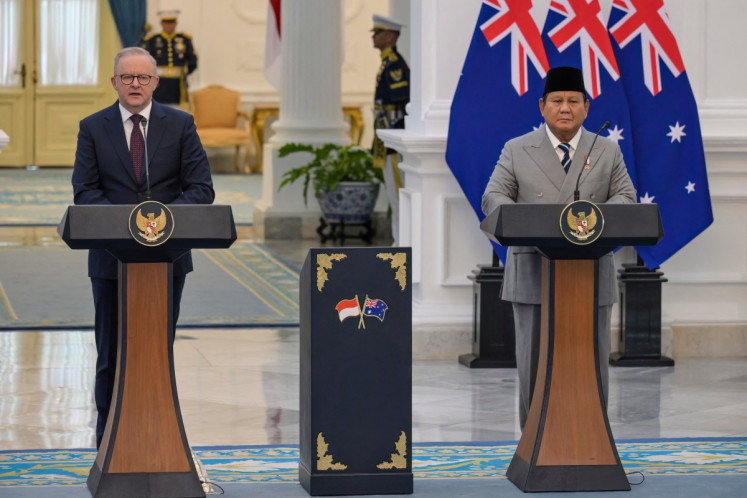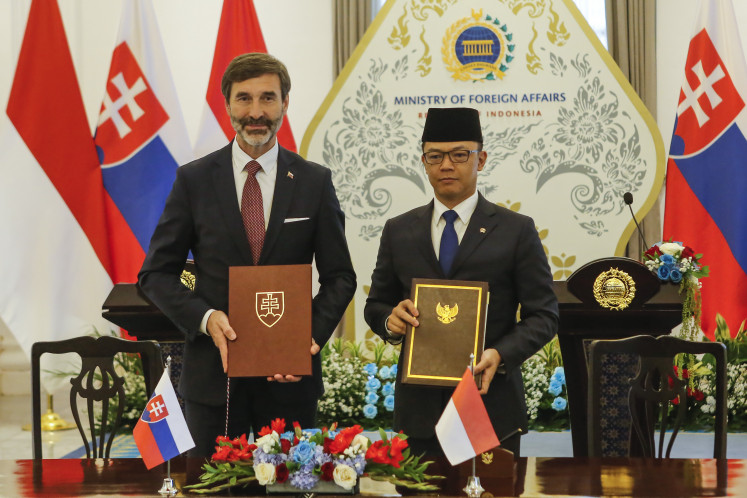Popular Reads
Top Results
Can't find what you're looking for?
View all search resultsPopular Reads
Top Results
Can't find what you're looking for?
View all search resultsNew Dutch government will aim to 'opt out' of EU asylum rules
Wilders won an election nearly six months ago and reached a deal on Wednesday to form a coalition with three right-wing partners. He has not yet proposed his choice for prime minister, but has ruled himself out.
Change text size
Gift Premium Articles
to Anyone
 Dutch far-right PVV party leader Geert Wilders (C) is escorted away by police after speaking at a gathering of supporters of British far-right spokesman Tommy Robinson in central London on June 9, 2018, following the jailing of Robinson for contempt of court.
Daniel LEAL-OLIVAS / AFP (AFP/Daniel Leal-Olivas)
Dutch far-right PVV party leader Geert Wilders (C) is escorted away by police after speaking at a gathering of supporters of British far-right spokesman Tommy Robinson in central London on June 9, 2018, following the jailing of Robinson for contempt of court.
Daniel LEAL-OLIVAS / AFP (AFP/Daniel Leal-Olivas)
T
he incoming Dutch government led by nationalist Geert Wilders' PVV party will aim to pursue its curbs on immigration by opting out of European Union migration rules, setting up a clash with Brussels before it has even taken office.
Wilders won an election nearly six months ago and reached a deal on Wednesday to form a coalition with three right-wing partners. He has not yet proposed his choice for prime minister, but has ruled himself out.
In its government plan published early on Thursday, the four-party coalition says it will aim for the "strictest-ever asylum regime" with stronger border controls and harsher rules for asylum seekers who arrive in the Netherlands.
"An opt out clause for European asylum and migration policies will be submitted as soon as possible to the European Commission," the coalition says in its pact.
Wilders said the plan would make the Netherlands less attractive for asylum seekers, adding that "people in Africa and the Middle East will start thinking they might be better off elsewhere".
The Netherlands would join Hungary and Poland's previous nationalist government in challenging EU migration policy. Brussels is likely to resist, as EU countries have already agreed on their migration pact and opt outs are usually discussed in the negotiating phase.
"We have a new pact on migration and asylum, which has been voted upon and confirmed and therefore has to be applied," EU Commission spokesman Eric Mamer said at a press briefing in Brussels.
"This legislation will be applied and the commission will play its role in making sure it is."
The Dutch coalition parties said labour migration would also be curbed, and admittance of foreign students to Dutch universities will become stricter.
Workers from outside the EU who do not have specific knowledge or expertise would need a work permit and recruiting agencies will face stricter regulation. The coalition says it would also strive to limit free movement for people from countries joining the EU in the future.
Tech industry association FME, representing firms including semiconductor industry powerhouse ASML, said it was concerned such measures would hamper hiring by tech firms.
On climate change, the coalition said it would stick to internationally agreed goals, but would not add any national restrictions on planet-warming emissions.
Offshore gas production in the North Sea would be increased, while the government would continue with plans to build four nuclear reactors in the coming decade.
The new government also plans 14 billion euros ($15.22 billion) in spending cuts through 2028, including cuts of 2.5 billions euros to development aid, a billion euros on government salaries and 100 million euros on the public broadcaster's budget.
The Netherlands would keep up political and military support to Ukraine and will make it legally binding to spend at least 2 percent of Dutch gross domestic product on defence, in line with NATO agreements, it said.
Later on Thursday, Wilders told AFP it could take "years" for the Netherlands' new government to fulfil its pledge to opt-out of the EU asylum system, but vowed the nation would enforce its strictest asylum policy ever.
Speaking to AFP after clinching a coalition deal six months in the making, Wilders said: "We will try to get a so-called opt-out for asylum, as the Danish have. That might take years if it is successful anyway."
Denmark negotiated a deal to exclude the country from being bound by common EU asylum policies and the new Dutch government plans to ask the European Commission for the same as soon as possible.
But Wilders said that in the short-term, the new right-wing government would aim to use Dutch law to restrict what he called an "influx of asylum-seekers" in the Netherlands.
"What we have today in our agreement is really the most tough anti-asylum (policy) ever being implemented in the Netherlands," he told AFP.









